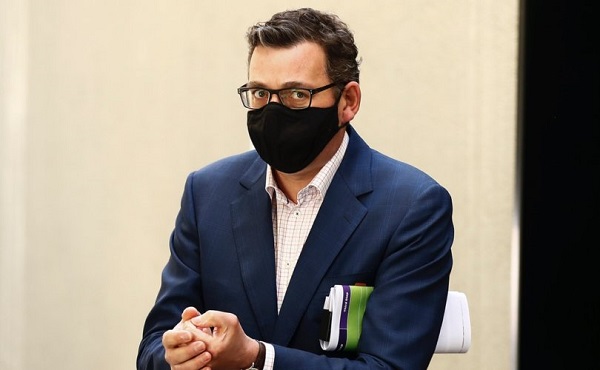Business
COVID response closed more Canadian businesses than 2008 financial crisis: gov’t report

From LifeSiteNews
StatsCan revealed that they are witnessing an increase in ‘zombie businesses,’ a phenomenon which occurs when owners never file for bankruptcy but simply walk away from their business.
Statistics Canada has revealed that more businesses closed as a result of the COVID-induced economic downturn than the 2008 financial crisis.
On October 25, Statistics Canada reported that the COVID-19 “pandemic” caused a record number of small businesses to shut down, with many owners never filing for bankruptcy but instead simply walking away from their companies, resulting in a large uptick in a phenomenon called “zombie businesses,” according to information obtained by Blacklock’s Reporter.
“This finding represents a larger increase than observed during the 2008 financial crisis when the exit rate increased by one percentage point,” wrote analysts.
The 2007- 2008 financial crisis, also called the Global Financial Crisis, is considered the most severe worldwide economic crisis since the Great Depression of 1929.
Business exits refer to the permanent closure of a business and can occur without a formal process, meaning owners can walk away from their businesses without declaring bankruptcy.
According to StatsCan, exits increased at the same time as bankruptcies fell, which is partly because courts were closed due to COVID lockdowns.
However, analysts noted that exits did not appear in bankruptcy court statistics, adding, “Formal insolvencies are not the whole story. Formal insolvency is but one path a business in distress may take.”
“The COVID-19 pandemic had a substantial impact on business dynamics leading to the temporary or permanent closure of many businesses,” analysts continued.
According to a Department of Industry estimate, Canada had 1,198,632 small businesses before COVID lockdowns. While the number has been revealed to have decreased drastically since then, federal agencies have failed to record comprehensive figures on the economic impact of COVID lockdowns and regulations.
“In my view there are hundreds of thousands of zombie businesses, businesses that are essentially dead but haven’t finalized the closure process altogether,” Dan Kelly, CEO of the Canadian Federation of Independent Business, testified at 2020 hearings of the Senate national finance committee. “We are seeing greater numbers of business failures that actually haven’t been reported. We’re only at the tip of the iceberg.”
According to a 2022 Bank of Canada survey, only an estimated half of businesses reopened after being closed by COVID lockdowns. The research tracked 12,976 businesses throughout Vancouver, Toronto and Ottawa including bars, restaurants, shops, nightclubs and motels, which were locked down by COVID regulations in April and May 2021.
“Half of businesses recorded as temporarily closed in May had reopened by the end of September,” the Bank reported. “Forty percent were still hibernating. Ten percent were closed for good.”
Statistics Canada’s report comes as Liberals MPs recently opted for a closed-door review by Minister of Health advisers of how the Canadian government handled the COVID-19 “pandemic” instead of launching a public inquiry.
In recent months, numerous reports have emerged revealing the Trudeau government’s mismanagement during the COVID-19 “pandemic.”
In a 2021 report Pandemic Preparedness, the Auditor General revealed that the cabinet was “not adequately prepared.”
Furthermore, Lessons Learned From The Public Health Agency Of Canada’s COVID-19 Response, an internal audit, condemned managers for “confusion,” “limited public health expertise” and “no clear understanding” of how to compile critical data.
Additionally, former Finance Minister Bill Morneau declared that spending programs to tackle COVID were prolonged and led to inflation under Prime Minister Justin Trudeau’s leadership.
During the so-called COVID-19 pandemic, the Trudeau government issued billions to Canadians who claimed they needed Canadian Emergency Response Benefits (CERB) as they were not permitted to work under COVID regulations.
Recently, the Canadian Revenue Agency (CRA) has worked to take back the $3.2 billion from Canadians who filed for and were given CERB despite not being eligible to receive it. However, many are fighting in court to keep their government payments.
Automotive
Major automakers push congress to block California’s 2035 EV mandate

 MxM News
MxM News
Quick Hit:
Major automakers are urging Congress to intervene and halt California’s aggressive plan to eliminate gasoline-only vehicles by 2035. With the Biden-era EPA waiver empowering California and 11 other states to enforce the rule, automakers warn of immediate impacts on vehicle availability and consumer choice. The U.S. House is preparing for a critical vote to determine if California’s sweeping environmental mandates will stand.
Key Details:
-
Automakers argue California’s rules will raise prices and limit consumer choices, especially amid high tariffs on auto imports.
-
The House is set to vote this week on repealing the EPA waiver that greenlit California’s mandate.
-
California’s regulations would require 35% of 2026 model year vehicles to be zero-emission, a figure manufacturers say is unrealistic.
Diving Deeper:
The Alliance for Automotive Innovation, representing industry giants such as General Motors, Toyota, Volkswagen, and Hyundai, issued a letter Monday warning Congress about the looming consequences of California’s radical environmental regulations. The automakers stressed that unless Congress acts swiftly, vehicle shipments across the country could be disrupted within months, forcing car companies to artificially limit sales of traditional vehicles to meet electric vehicle quotas.
California’s Air Resources Board rules have already spread to 11 other states—including New York, Massachusetts, and Oregon—together representing roughly 40% of the entire U.S. auto market. Despite repeated concerns from manufacturers, California officials have doubled down, insisting that their measures are essential for meeting lofty greenhouse gas reduction targets and combating smog. However, even some states like Maryland have recognized the impracticality of California’s timeline, opting to delay compliance.
A major legal hurdle complicates the path forward. The Government Accountability Office ruled in March that the EPA waiver issued under former President Joe Biden cannot be revoked under the Congressional Review Act, which requires only a simple Senate majority. This creates uncertainty over whether Congress can truly roll back California’s authority without more complex legislative action.
The House is also gearing up to tackle other elements of California’s environmental regime, including blocking the state from imposing stricter pollution standards on commercial trucks and halting its low-nitrogen oxide emissions regulations for heavy-duty vehicles. These moves reflect growing concerns that California’s progressive regulatory overreach is threatening national commerce and consumer choice.
Under California’s current rules, the state demands that 35% of light-duty vehicles for the 2026 model year be zero-emission, scaling up rapidly to 68% by 2030. Industry experts widely agree that these targets are disconnected from reality, given the current slow pace of electric vehicle adoption among the broader American public, particularly in rural and lower-income areas.
California first unveiled its plan in 2020, aiming to make at least 80% of new cars electric and the remainder plug-in hybrids by 2035. Now, under President Donald Trump’s leadership, the U.S. Transportation Department is working to undo the aggressive fuel economy regulations imposed during former President Joe Biden’s term, offering a much-needed course correction for an auto industry burdened by regulatory overreach.
As Congress debates, the larger question remains: Will America allow one state’s left-wing environmental ideology to dictate terms for the entire country’s auto industry?
Business
Net Zero by 2050: There is no realistic path to affordable and reliable electricity

 By Dave Morton of the Canadian Energy Reliability Council.
By Dave Morton of the Canadian Energy Reliability Council.
Maintaining energy diversity is crucial to a truly sustainable future
Canada is on an ambitious path to “decarbonize” its economy by 2050 to deliver on its political commitment to achieve net-zero greenhouse gas (GHG) emissions. Although policy varies across provinces and federally, a default policy of electrification has emerged, and the electricity industry, which in Canada is largely owned by our provincial governments, appears to be on board.
In a November 2023 submission to the federal government, Electricity Canada, an association of major electric generators and suppliers in Canada, stated: “Every credible path to Net Zero by 2050 relies on electrification of other sectors.” In a single generation, then, will clean electricity become the dominant source of energy in Canada? If so, this puts all our energy eggs in one basket. Lost in the debate seem to be considerations of energy diversity and its role in energy system reliability.
What does an electrification strategy mean for Canada? Currently, for every 100 units of energy we consume in Canada, over 40 come to us as liquid fuels like gasoline and diesel, almost 40 as gaseous fuels like natural gas and propane, and a little less than 20 in the form of electrons produced by those fuels as well as by water, uranium, wind, solar and biomass. In British Columbia, for example, the gas system delivered approximately double the energy of the electricity system.
How much electricity will we need? According to a recent Fraser Institute report, a decarbonized electricity grid by 2050 requires a doubling of electricity. This means adding the equivalent of 134 new large hydro projects like BC’s Site C, 18 nuclear facilities like Ontario’s Bruce Power Plant, or installing almost 75,000 large wind turbines on over one million hectares of land, an area nearly 14.5 times the size of the municipality of Calgary.
Is it feasible to achieve a fully decarbonized electricity grid in the next 25 years that will supply much of our energy requirements? There is a real risk of skilled labour and supply chain shortages that may be impossible to overcome, especially as many other countries are also racing towards net-zero by 2050. Even now, shortages of transformers and copper wire are impacting capital projects. The Fraser Institute report looks at the construction challenges and concludes that doing so “is likely impossible within the 2050 timeframe”.
How we get there matters a lot to our energy reliability along the way. As we put more eggs in the basket, our reliability risk increases. Pursuing electrification while not continuing to invest in our existing fossil fuel-based infrastructure risks leaving our homes and industries short of basic energy needs if we miss our electrification targets.
The IEA 2023 Roadmap to Net Zero estimates that technologies not yet available on the market will be needed to deliver 35 percent of emissions reductions needed for net zero in 2050. It comes then as no surprise that many of the technologies needed to grow a green electric grid are not fully mature. While wind and solar, increasingly the new generation source of choice in many jurisdictions, serve as a relatively inexpensive source of electricity and play a key role in meeting expanded demand for electricity, they introduce significant challenges to grid stability and reliability that remain largely unresolved. As most people know, they only produce electricity when the wind blows and the sun shines, thereby requiring a firm back-up source of electricity generation.
Given the unpopularity of fossil fuel generation, the difficulty of building hydro and the reluctance to adopt nuclear in much of Canada, there is little in the way of firm electricity available to provide that backup. Large “utility scale” batteries may help mitigate intermittent electricity production in the short term, but these facilities too are immature. Furthermore, wind, solar and batteries, because of the way they connect to the grid don’t contribute to grid reliability in the same way the previous generation of electric generation does.
Other zero-emitting electricity generation technologies are in various stages of development – for example, Carbon Capture Utilization and Storage (CCUS) fitted to GHG emitting generation facilities can allow gas or even coal to generate firm electricity and along with Small Modular Reactors (SMRs) can provide a firm and flexible source of electricity.
What if everything can’t be electrified? In June 2024, a report commissioned by the federal government concluded that the share of overall energy supplied by electricity will need to roughly triple by 2050, increasing from the current 17 percent to between 40 and 70 percent. In this analysis, then, even a tripling of existing electricity generation, will at best only meet 70 percent of our energy needs by 2050.
Therefore, to ensure the continued supply of reliable energy, non-electrification pathways to net zero are also required. CCUS and SMR technologies currently being developed for producing electricity could potentially be used to provide thermal energy for industrial processes and even building heat; biofuels to replace gasoline, diesel and natural gas; and hydrogen to augment natural gas, along with GHG offsets and various emission trading schemes are similarly
While many of these technologies can and currently do contribute to GHG emission reductions, uncertainties remain relating to their scalability, cost and public acceptance. These uncertainties in all sectors of our energy system leaves us with the question: Is there any credible pathway to reliable net-zero energy by 2050?
Electricity Canada states: “Ensuring reliability, affordability, and sustainability is a balancing act … the energy transition is in large part policy-driven; thus, current policy preferences are uniquely impactful on the way utilities can manage the energy trilemma. The energy trilemma is often referred to colloquially as a three-legged stool, with GHG reductions only one of those legs. But the other two, reliability and affordability, are key to the success of the transition.
Policymakers should urgently consider whether any pathway exists to deliver reliable net-zero energy by 2050. If not, letting the pace of the transition be dictated by only one of those legs guarantees, at best, a wobbly stool. Matching the pace of GHG reductions with achievable measures to maintain energy diversity and reliability at prices that are affordable will be critical to setting us on a truly sustainable pathway to net zero, even if it isn’t achieved by 2050.
Dave Morton, former Chair and CEO of the British Columbia Utilities Commission (BCUC), is with the Canadian Energy Reliability Council.
-

 2025 Federal Election2 days ago
2025 Federal Election2 days agoMark Carney: Our Number-One Alberta Separatist
-

 2025 Federal Election2 days ago
2025 Federal Election2 days agoNine Dead After SUV Plows Into Vancouver Festival Crowd, Raising Election-Eve Concerns Over Public Safety
-

 International2 days ago
International2 days agoJeffrey Epstein accuser Virginia Giuffre reportedly dies by suicide
-

 2025 Federal Election2 days ago
2025 Federal Election2 days agoColumnist warns Carney Liberals will consider a home equity tax on primary residences
-

 2025 Federal Election1 day ago
2025 Federal Election1 day agoCanada is squandering the greatest oil opportunity on Earth
-

 International1 day ago
International1 day agoU.S. Army names new long-range hypersonic weapon ‘Dark Eagle’
-

 Autism21 hours ago
Autism21 hours agoUK plans to test children with gender confusion for autism
-

 COVID-1920 hours ago
COVID-1920 hours agoFormer Australian state premier accused of lying about justification for COVID lockdowns

